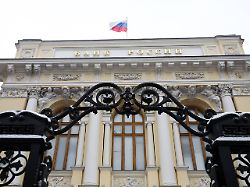G7 considers confiscation
Russia is becoming restless when it comes to central bank reserves
December 29, 2023, 1:51 p.m
Listen to article
This audio version was artificially generated. More info | Send feedback
Hundreds of billions of dollars from the Russian central bank are placed in the Western financial system – but remain frozen by sanctions. Next year the money could be used to finance Ukraine. Russia is already threatening retaliation.
Russia has threatened to confiscate assets from Europe and the US if the G7 countries seize $300 billion in frozen reserves from the Russian central bank. Presidential spokesman Dmitry Peskov spoke of theft, a violation of international law and a danger to the global financial system in view of reports of corresponding considerations by the seven leading industrial nations (G7).
“It would undermine other countries’ trust in the US and the EU as economic guarantors,” said Peskov, who answered in the affirmative when asked whether there was a list of Western assets that Russia could seize in retaliation. He did not give any details.
On Thursday, insiders said that the heads of state and government of the G7 countries were likely to discuss a new legal approach to the collection of the frozen funds at their summit in February. Next year, the EU could support Ukraine for the first time with proceeds from the custody of frozen Russian central bank funds. The EU Commission presented proposals for legal texts for this purpose this month. As a first step, you should ensure that the income is stored separately.
Damage in Ukraine more than 400 billion dollars
In a second step, it is planned to forward part of the funds to Ukraine. A sum of billions would probably be incurred every year, since, according to the Commission, more than 200 billion euros from the Russian central bank have been frozen in the EU and the income from the custody of the capital is constantly increasing. No decisions have been made yet. In addition, laws would have to be changed, at least in the USA and Great Britain.
According to the World Bank, the damage caused by Russia in Ukraine now exceeds $400 billion. The central bank in Moscow does not disclose which assets are frozen because of the war in Ukraine. According to the US government, most bonds and deposits are assets denominated in euros, as well as some in dollars and pounds.
Germany has so far confiscated 4.1 billion euros in Russian assets. This sum includes frozen Russian assets, assets of persons on sanctions lists and blocked assets of the Russian Central Bank.
